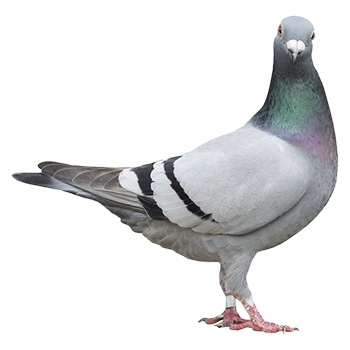Bird Control

Viking Pest Control does not offer Carcass & Dead Animal Removal. Animal removal is only completed by our team when an animal is found in a wildlife trap. Please contact your municipal office for local animal removal vendors.
Birds are a natural part of our ecosystem and most make a bird-watcher’s pastime worthwhile. However, there are some bird species considered pests around your home or business, and if this is the case, it’s important to learn which are pest birds. To protect your home or business from pest birds, you need to learn about the behavior of this pest, take steps for prevention, and find effective treatment options should an infestation occur.
Which Birds Are Considered Pests?
Bird control experts at Bird Doctor explain that over 1,000 different species of birds reside in the U.S. While bird-watching enthusiasts and conservation efforts suggest that most birds are highly valued, some species are considered pest birds due to their detrimental impact on property and local ecosystems throughout New Jersey, Pennsylvania, Maryland, and Delaware.
National, state, and local regulations protect many migratory birds throughout the U.S. However, birds commonly seen as pests in New Jersey, Pennsylvania, Maryland, and Delaware, are usually invasive species, and therefore not protected by national ordinances. These pest birds are the most common subjects of our bird control products and services. These usually include:
Common Pigeons
While some species in the Columbidae family are protected, the common pigeon in New Jersey, Pennsylvania, Maryland, and Delaware is not. Also known as rock doves or rock pigeons, these birds are plump with short legs and small heads. Although plumage coloration varies, rock pigeons commonly sport light gray feathers with black bands on the wings and iridescent plumage at the throat.
House Sparrows
Bird control experts say although they may look similar to many native North American sparrows, common house sparrows were introduced to North America in the 1800s and are therefore considered an invasive species. House sparrows are stocky, compact birds with short beaks. Females are buff and brown on top and light gray on their necks and stomachs. Males tend to feature a reddish-chestnut color within banded black patterns on their wings.
European Starlings
Much like house sparrows, European starlings were introduced to North America in the 1800s and tend to nest and congregate in developed areas. Starlings have long, narrow bills and glossy black and iridescent feathers. In winter, they also have white spots contrasting with the black plumage (which is widely believed to be the origin of their name).
Migratory Birds and Woodpeckers
Disclaimer
Migratory birds, including woodpeckers, are protected under Federal Law under the Migratory Bird Treaty Act. Due to their protection, Viking Pest Control cannot complete any bird control service for migratory birds. For more information regarding their protection, please visit https://www.fws.gov/birds/policies-and-regulations/laws-legislations/migratory-bird-treaty-act.php
How Do I Prevent Invasive Birds From Becoming Pests in My Home or Business?
Some preventive bird control measures can stop these animals from becoming a problem in your home or business. Like all birds, pigeons, sparrows, and starlings gravitate toward ready food sources. Therefore, the best way to prevent them from taking over your home or business is to avoid making their preferred meals available. Keep garbage impossible to access in lidded containers. If you have bird feeders around your yard in order to attract local bird species, limit them to food that only the native species eat. Avoid common commercial birdseed mixtures that include cracked corn, sunflower seeds, and suet.
Bird control experts at Bird Doctor recommend discouraging pest birds by limiting nesting areas that they’d like. European sparrows especially love to nest in the eaves, rafters, pipes, and gutters around homes. Keep sheds and garages closed, and seal up birdhouses that you might have during the migratory season. Bird control experts at Bird Doctor reveal most pest birds don’t migrate and therefore tend to grab nesting places before native, migratory birds return to the nest.
What Are the Effects of Pest Birds Around My Home and Business Throughout New Jersey, Pennsylvania, Maryland, and Delaware?
Bird control experts at Bird Doctor say a few birds around your home or business may seem innocuous at first; however, the potential damage to your property and health could be significant. Here are some ways that bird pests can impact your home or business and require bird control services.
Health
There’s a reason you’ve heard pigeons called the “rats of the sky.” These birds are huge carriers of disease, most commonly encephalitis and salmonella. When inhaled, pigeon waste can trigger sicknesses like cryptococcosis, histoplasmosis, and psittacosis. Pigeons can also carry additional pests, including fleas, ticks, and lice.
Damage to Property
In addition to health concerns, a heavy bird population can cause significant damage to property. Nests may block important ventilation, bird droppings can permanently damage finished surfaces on homes and cars, and birds can also contaminate livestock food and water or damage crops.
Environmental Impact
One of the biggest ways that bird pests affect your home is they crowd out native species. Since these birds don’t migrate, they have an advantage come nesting season, and they tend to flock in bigger numbers than native songbirds. Pigeons, European starlings, and house sparrows all have had a monumental impact on native ecosystems, from local birds’ nesting and feeding patterns to the balance of insect populations. Bird control experts emphasize starlings are especially considered highly aggressive toward native species in New Jersey, Pennsylvania, Maryland, and Delaware.
Disturbance
Bird control experts at Bird Doctor say birds can cause significant disturbance when nesting in residential areas. The most frequent complaint known is about noisy starlings, which tend to congregate in loud, large flocks throughout the winter. Even quieter birds can cause a noise disturbance when they nest or roost within the vents of a home or business.
What Are the Lifecycles and Habits of Pigeons, Starlings, and Sparrows?
Habits and behavior of bird pests vary across species, and so it’s essential to understand what kind of bird you’re dealing with in order to understand how to strategically enact effective bird control. Learn more about the habits of the most common breeds of pest birds below in New Jersey, Pennsylvania, Maryland, and Delaware.
Common Pigeons
The common pigeon usually lives roughly six years in the wild. Although their natural diet is fruit and seeds, most pigeons in urban areas primarily feed on leftovers from humans, especially bread. Pigeons may mate for life and raise nestlings as a pair. Although pigeons only have one or two eggs at a time, a couple can produce five or more broods per year. Pigeons travel and feed in large flocks and usually use the same nest multiple times.
European Starlings
Starlings usually live two to three years in the wild. Congregating in residential areas, they eat just about anything, although they prefer insects when available. Starlings are unusually intelligent and aggressive, which largely accounts for their success as an invasive species. Starlings usually have two broods per year, with four to six eggs in each brood.
House Sparrows
Bird control experts reveal much like starlings, sparrows live about two or three years in the wild, with two broods per year and four to six eggs in each brood. Their preferred food source is grain and seeds. Because their size, behavior, and diet closely match those of many native species, sparrows commonly outcompete local birds for nesting space and food.

What if a Protected Bird Has Become a Pest on My Property?
Although this article focuses primarily on species that cause the most pest problems throughout Pennsylvania, New Jersey, Maryland, and Delaware, there are undeniably other species that can be a huge hassle for homeowners and business owners. Bird control services are especially necessary if you have a bird incident in which birds have created a nest within your home and office building.
Other species that may cause problems include crows, seagulls, and grackles. This is when a thorough understanding of bird behavior and habits becomes such an asset. Viking Pest exercises methods of bird control that have a positive effect on local ecosystems and it carefully maintains state, federal, and local guidelines for population control.
If you have questions about which species of birds are protected, you can view the U.S. Fish and Wildlife Service’s full list of in-danger species.
Will There Be a Disruption to My Business or Home During Bird Control?
Different cases call for varying levels of care, some of which may require ladders and construction materials on-site. For example, if there’s a problem with nesting and roosting within your building’s rafters or air ducts, it may be best to approach and evaluate the situation from the inside as well as outside access points. However, our bird control technicians at Bird Doctor are specially trained to use an effective, minimally disruptive methodology and conduct themselves with the utmost consideration for our customers. Our schedule will be based on your needs in order to cause as little disruption to your day as possible.
Do Fake Owls and Other Visual Deterrents Work for Preventing Birds?
Fake owls can work effectively to deter birds, but only temporarily. In fact, anything newly introduced to an environment causes birds to be cautious, whether you hang streamers or start playing music from a stereo. However, birds quickly adapt to the situation and resume their usual behavior as soon as they notice that the new deterrents never move or act.
Does Viking’s Bird Doctor Follow OSHA Safety Standards?
Absolutely. Our pest control technicians undergo regular mandatory safety training and adhere to a strict code of conduct. We know that bird control scenarios can sometimes become unpredictable, so our personnel wear safety gear and take appropriate safety measures at all times.
Does Viking’s Bird Doctor Offer a Work Guarantee for Bird Control?
We do indeed. We have the utmost confidence in our bird control services, which is why we offer a no-cost re-treatment visit if our bird control isn’t effective the first time. This guarantee applies to both services rendered and materials used. Our job isn’t done until your pest problem is completely resolved. Call or schedule online a FREE ESTIMATE today!














